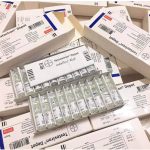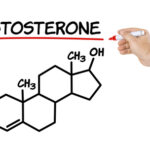Apple Cider Vinegar And Testosterone Reload

What is apple cider vinegar?
Vinegar comes from the French phrase vin aigre, meaning sour wine. The sourness comes from the acetic acid. Making apple cider vinegar entails taking advantage of controlled spoilage.
Yeast digests the sugars in apples and converts them into alcohol. A bacteria, acetobacter, then turns the alcohol into acetic acid. I don’t want to get too technical, but you can call this process fermentation. The “mother” refers to the combination of yeast and bacteria formed during fermentation. If you look at an apple cider vinegar bottle, you can see strands of the “mother” floating around.
Many people attribute apple cider vinegar’s effects to the “mother.” There’s some truth to this since the mother counts as a probiotic. But, the importance of the mother has not been established with research. Aside from probiotics, ACV has a vitamin profile similar to apple juice. Hence, the sour drink is ripe with B-vitamins and polyphenols (plant-based antioxidants). All in all, the probiotics, acetic acid, and nutrients in ACV are responsible for their health benefits.
What is Testosterone?
Testosterone is the male sex hormone that is made in the testicles. Testosterone hormone levels are important to normal male sexual development and functions.
During puberty (in the teen years), testosterone helps boys develop male features like body and facial hair, deeper voice, and muscle strength. Men need testosterone to make sperm. Testosterone levels generally decrease with age, so older men tend to have low blood testosterone levels.
A normal range is typically 300 to 1,000 ng/dL, according to the Food and Drug Administration. A blood test called a serum testosterone test is used to determine your level of circulating testosterone.
Some men have low testosterone levels. This is called Testosterone Deficiency Syndrome (TD) or Low Testosterone (Low-T). Deficiency means that the body does not have enough of a needed substance. According to the American Urological Association (AUA), about 2 out of 10 men older than 60 years have low testosterone. That increases slightly to 3 out of 10 men in their 70s and 80s.
Men can experience a range of symptoms if testosterone decreases more than it should. Low testosterone, or low T, is diagnosed when levels fall below 300 nanograms per deciliter (ng/dL). The symptoms or conditions that may accompany Low-T include:
- Low sex drive
- Fatigue
- Reduced lean muscle mass
- Irritability
- Erectile dysfunction
- Depression.
There are many other possible reasons for these symptoms, such as opioid use, some congenital conditions (medical conditions you are born with), loss of or harm to the testicles, diabetes, and obesity (being overweight). See your doctor if you have any of these symptoms.
Does apple cider vinegar boost testosterone production?
Yes, animal studies have shown that apple cider vinegar can cause a significant increase in serum testosterone as well as improvement in sperm parameters but there is no scientific evidence to support the claim that apple cider vinegar improves erectile function or helps your penis increase in size.
Apple cider vinegar also pushes toxins out of the body all while supplying your body with natural minerals, vitamins, and enzymes. It can break up mucus and promote better lymph circulation in addition to aiding digestion. Its high levels of potassium help clear sinus infections, candida, sore throats, and allergies.
How to increase testosterone naturally
According to singlecare, making healthy lifestyle changes and eating a healthy diet can do a lot to boost testosterone levels, help you feel better, and improve your overall health. Some natural ways to raise lower testosterone levels include:
Lose weight: Weight loss is essential because fat cells in the body convert testosterone into estrogen. Losing weight can prevent this conversion and increase testosterone levels naturally. However, not all men with low T are overweight. Research shows that over 50% of obese men have lab-proven hypogonadism, which is when testosterone levels are below 300 ng/dL. Confirming this, one study of obese men who underwent weight-loss surgery found that within one year of their procedure, their testosterone rose from a pre-surgery average of 295 ng/dL to 423 ng/dL post-surgery.
Exercise: Besides its ability to help you lose weight, exercise has also been shown to boost testosterone. In one study that compared both men and women who either lifted free weights or used weight machines for a total of eight weeks, the men who used the free weights had a greater increase in what’s known as “free testosterone” (testosterone that isn’t bound to proteins and can connect to testosterone receptors in the cells) than the men who used the weight machines. A study that examined men’s daily step counts and their testosterone levels found that those who took more than 4,000 steps a day had significantly lower odds of having low total testosterone levels than those who took fewer steps. What’s more, for each additional 1,000 steps the men took, total testosterone levels increased by 7 ng/dL.
Get good sleep: Testosterone levels increase as you sleep, which may explain why men who are chronically sleep-deprived can have lower levels of testosterone. One study examined the testosterone levels in young, healthy men after they slept eight to ten hours for a series of nights and then restricted sleep to five hours per night for eight nights. Overall, the men’s testosterone levels decreased 10%-15% after the eight days of restricted sleep.
Avoid testosterone Lowering substances: Substance abuse is an important cause of low testosterone levels. Research shows that low testosterone can result from things like chronic alcohol abuse (but not low-to-moderate alcohol intake) and opioid use. Other substances, such as cigarette and marijuana smoking, can also negatively affect testicular tissue and sperm health—although not testosterone production, per se.
Take supplements that boost testosterone: In one study, subjects who received vitamin D supplementation showed significant increases in testosterone compared to those in the control group. The American Academy of Family Physicians recommends that men with low testosterone get 600 IUs (international units) of vitamin D daily and also 11 milligrams of zinc, another testosterone-boosting mineral, per day. You can opt to eat more foods rich in zinc, which includes meat, poultry, shellfish, whole grains, beans, and nuts, or take a zinc supplement. Both vitamin D and zinc supplements are available over the counter.





